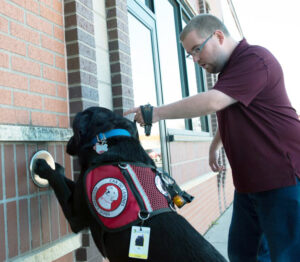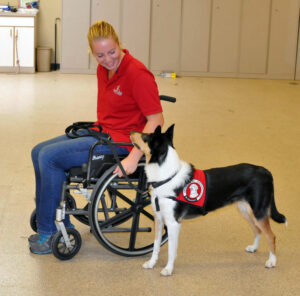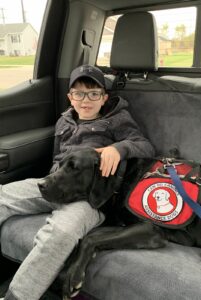 Can Do Canines encourages medical professionals to become familiar with the ways an assistance dog could make a difference in their clients' lives.
Can Do Canines encourages medical professionals to become familiar with the ways an assistance dog could make a difference in their clients' lives.
A dog that has been trained to perform specific skills to help a person with a disability. The terms “assistance dog” and “service dog” are generally considered synonymous. Since Can Do Canines is accredited by Assistance Dogs International, we use the term “assistance dog.”
No. Under the Americans With Disabilities Act, an assistance/service dog is a dog trained to help a specific person with their disability by performing a physical task. Only these types of dogs have accessibility rights into public places where dogs are normally not allowed.
These types of dogs provide stability, safety, a feeling of independence and more freedom for the client. In many cases, their help in performing tasks can help conserve energy, enabling the client to do more during the day and to feel a sense of safety during a medical crisis.
For those living in Minnesota and Wisconsin, there are several organizations—small and large. Can Do Canines is one of two based in Minnesota that is accredited by Assistance Dogs International (ADI). Some charge for their trained dogs, others are nonprofits and do not charge a fee. It is highly recommended that the client do their homework on the organization they are interested in to ensure a good fit for them and that the organization is legitimate.
Can Do Canines has been serving people living with disabilities for over 35 years. We are accredited by Assistance Dogs International, www.assistancedogsinternational.org, and have trained and placed dogs with over 900 clients to date. Other than a $50 application fee, we do not charge for our assistance dogs.

Mobility Assist Dogs
 Mobility Assist Dogs help people with physical disabilities. While the needs of each client can vary, Mobility Assist Dogs are trained to provide support by:
Mobility Assist Dogs help people with physical disabilities. While the needs of each client can vary, Mobility Assist Dogs are trained to provide support by:
- opening and closing doors
- picking up and retrieving dropped objects
- activating push plates
- bringing cane or walker within reach
- carrying small objects up/down stairs
- turning light switches on or off
- retrieving a cordless phone or cell phone
- getting help or pressing a life-alert button
A client can be mobile but have balance issues, thus necessitating the need for retrieval of dropped items, help with stability, etc. The client can also be using assistive devices such as a cane, walker or wheelchair.
A few of the typical diagnoses of applicants for mobility dogs include—but are not limited to—MS, cerebral palsy, Parkinson’s, muscular dystrophy and POTS, but this is just a small sample of what we commonly hear from clients.
Hearing Assist Dogs
Hearing Assist Dogs alert a person who is deaf or hard of hearing to sounds they cannot hear. The dog will paw or nose nudge their human partner when certain sounds occur, then lead them to the source of the sound.
Some of the sounds the dogs are trained to alert to include:
- a door knock or doorbell
- an oven timer
- a smoke detector
- an alarm clock
Diabetes Assist Dogs
Diabetes Assist Dogs are trained to monitor smells in the air for a specific scent from their human partner that is related to rapidly dropping or low blood sugar levels. If detected, the dog will then “alert” the person with diabetes, usually by touching them in a significant way such as pawing or nudging them. The handler then knows to check their blood sugar level and perhaps get something to eat or drink to prevent hypoglycemia.
Our dogs are only trained to assist type 1 diabetics. We do not train our dogs to detect unusual highs, only blood glucose lows (a low is considered anything under 70).
Besides being taught their life-saving detection skill, our Diabetes Assist Dogs are often trained to:
- retrieve juice or glucose tabs
- get an emergency phone
- alert another person to come to the aid of their partner
Diabetes Assist Dogs wear a backpack, rather than just a basic vest, identifying them as an assistance dog. This backpack has pockets where medical information, a sugar source and emergency contact information can be stored. This provides an extra safety net in case the person with diabetes is unable to get help in time. Anyone finding the person unconscious or acting abnormally would know it may be a medical emergency and know how to get help.
Seizure Assist Dogs
Seizure Assist Dogs help people while they are having a seizure and afterwards during recovery.
Some of the common tasks our Seizure Assist Dogs perform include:
- licking or nudging the face of their partner to bring them back to consciousness faster
- getting an emergency phone
- retrieving an ice pack or compress
- nudging their partner to their side or on to their back during the seizure
In addition, the dog wears a backpack with pockets that can hold medicine and medical alert information in case the person is unable to communicate. We do not train our dogs to keep other people away during the seizure or to guard their partner.
It is important to note that Can Do Canines DOES NOT train Seizure Assist Dogs to pre-alert to seizures. Instead, our dogs are trained to help their partner in a number of ways once a seizure occurs. Some of our dogs exhibit a pre-alerting behavior during or after training is complete. If so, we can help “shape” that behavior if it does occur, so it will be of more benefit to the client. However, a person should not expect our assistance dogs to pre-alert to a seizure.
- lying on their partner during the seizure
- activating an implant using a magnet to help control the seizure
- touching a life-alert button
- alerting another person to come to the aid of their partner
- their partner’s name being called
- a phone ringing
- a baby crying
- a dropped item
Autism Assist Dogs
 Autism Assist Dogs help provide security and peace of mind to families of children with autism. When in public, the child wears a specially designed belt that connects a pack the dog wears to the child, while an adult handles the dog’s leash. If the child attempts to run (a common behavior for children with autism), the dog becomes a gentle, steady anchor to keep the child safe until the adult can get the situation under control.
Autism Assist Dogs help provide security and peace of mind to families of children with autism. When in public, the child wears a specially designed belt that connects a pack the dog wears to the child, while an adult handles the dog’s leash. If the child attempts to run (a common behavior for children with autism), the dog becomes a gentle, steady anchor to keep the child safe until the adult can get the situation under control.
Autism Assist Dogs also act as a social bridge, so when people talk to the child about their dog, it encourages the child to interact and make connections. Depending on the needs of the child, our dogs may also help by:
- gently interrupting stimming behavior
- lying across the child to provide deep pressure therapy
Can Do Canines places dogs with clients in the states of Minnesota and Wisconsin (though only in Minnesota at this time for autism assist dogs).
Hearing, Seizure and Diabetes Assist clients need to be at least 18 years old. Mobility Assist clients need to be 10 years of age or older. Autism assist dogs are in especially high demand. Clients need to be between ages 2 and 7 years with a pre-application completed. (See our website for more details.)
Mobility Assist:
- Must be a resident of Minnesota or Wisconsin
- Must have a physical disability, debilitating chronic illness or neurological disorder and can
provide proof of diagnosis - Must be physically and financially able to take full responsibility for the dog after certification
(being “physically able” can include the help of PCAs, family or friends) - Must be at least 10 years old
Hearing Assist:
- Must be a resident of Minnesota or Wisconsin
- Must be deaf or have a severe to profound hearing loss
- Must be physically and financially able to take full responsibility for the dog after certification
- Must be at least 18 years old
- Cannot currently own a dog unless applying to owner-train their pet
Diabetes Assist:
- Must be a resident of Minnesota or Wisconsin
- Must have type 1 diabetes complicated by hypoglycemic unawareness and can provide proof of diagnosis
- Must be physically and financially able to take full responsibility for the dog after certification
- Must be at least 18 years old
- Cannot currently own a dog unless applying to owner-train their pet
Seizure Assist:
- Must be a resident of Minnesota or Wisconsin
- Must have a seizure disorder
- Must be physically and financially able to take full responsibility for the dog after certification
- Must be at least 18 years old
- Cannot currently own a dog unless applying to owner-train their pet
Autism Assist:
- Family must reside in Minnesota
- Child must be between the ages of 2 and 7 years old when applying.
- Child must have an autism diagnosis
- Family must be physically and financially able to take full responsibility for the dog after
certification
One of the common perceptions Can Do Canines applicants share is that they debated considering an assistance dog because they didn’t feel their disability was severe enough to warrant receiving one. Sometimes it’s because they are relatively young, or they do not use an assistance device, or their disability is not noticeable to others, or for whatever reason, they feel that someone else is more deserving.
However, Can Do Canines explains the careful screening process to applicants, and frequently, those who felt they would not qualify are exactly the ones who might benefit the most from an assistance dog.
With Can Do Canines, there is a $50 application fee; otherwise, we do not charge clients for the dogs. We rely on donations for funding.
Those interested in applying for an assistance dog through Can Do Canines can call our office at 763-331-3000, email us at apply@candocanines.org or start the application process online.





